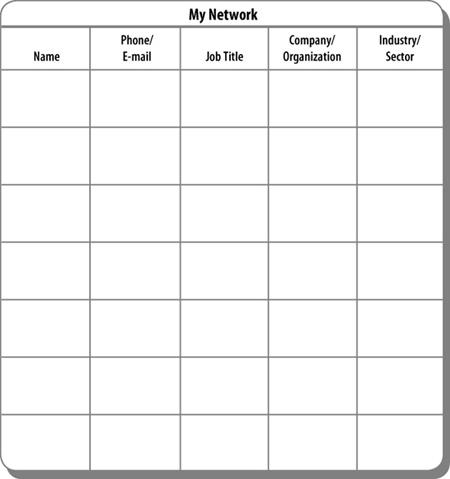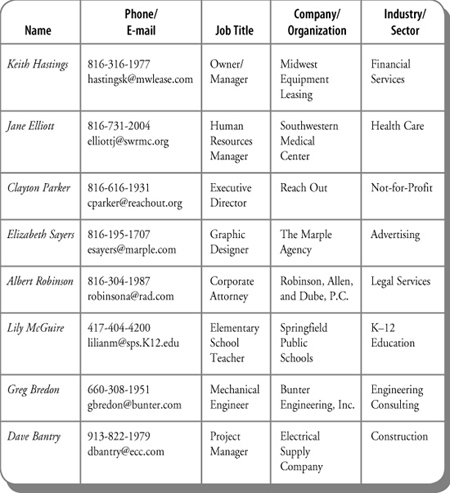3. Identifying Your Career Connections
How do you go about finding people for your child to talk to in an informational interview?
You tap into your own network of contacts.
You identify the networking contacts you already have and help your
child make career connections with those contacts.
Networking as a job-search strategy addresses
the fact that 70 percent of jobs available at any given time are never
advertised in traditional forums, such as newspaper want ads or
career/job Web sites. Most jobs are found by word of mouth, or
networking. To network in the job-search process means to get your name
and qualifications out there to as many people as possible so that
those people think of you when “hidden” jobs open up.
Networking in the career-planning process for
young people works the same way. Just as many good jobs are “hidden”
from adult job seekers, many good career paths are hidden from young
adults. Networking is the way your child can generate career ideas that
are not readily apparent when using the traditional method of choosing
a career, which in the United States is “choose a college major and
hope for the best.”
You may find the idea of
networking intimidating at first. If you haven’t had to look for a job
recently, you may think networking is beyond your ability. But
networking is just a structured way of getting and giving information
about jobs and careers.
Everyone has a network. To understand your
own network, think of eight working adults you know. These people can
be family members, friends, co-workers, or neighbors—anyone you are
comfortable talking with on an informal basis. Write the names of these
people on the My Network worksheet. Complete the worksheet with
information about each person.

The following worksheet shows you Jeff’s network.

Keith is the owner and sales manager of Midwest Equipment Leasing Company. Keith can give Jeff specific information about
• The job duties of a sales manager.
• How to run a successful small business.
• The equipment leasing industry in general.
• Sales as a profession.
• The financial services sector of the economy.
• Where the leasing equipment industry is going in the future.
• The specific education and work experience Jeff would need to get into the leasing industry.
• The job titles and duties of other employees at Midwest Equipment Leasing.
• How Jeff could get hired at Midwest Equipment Leasing Company.
Jane is the human resources manager for a large regional medical center. Jane can give Jeff specific information about
• Her job duties as an HR manager.
• The names of people working in a variety
of other health care careers, including nursing, respiratory therapy,
hospital administration, physical therapy, and so on.
• The field of human resources in general.
• Trends in hospital administration.
• Whether Southwestern Medical Center is hiring.
• How Jeff could get a job or an internship at Southwestern Medical Center.
• The names of other HR managers in the area who are members of her professional organization.
Clayton is the executive director of Reach
Out, a non-profit agency working with the elderly poor. Clayton can
give Jeff information about
• The role of an executive director in a non-profit agency.
• The field of social services in general.
• The not-for-profit sector of the economy.
• The different kinds of jobs that are part of an agency such as Reach Out.
• Contacts with other people working in social services.
• How to revise his resume to make it more effective.
Keith, Jane, and Clayton are all part of Jeff’s network.
Everyone has a network. If you identify the
members of your network, they can provide informational interviews for
your child. They can help your child brainstorm career ideas and
uncover additional job titles to research.
Members of your network can provide your
child with three kinds of interviews that are part of the job-search
process. These include informal interviews, informational interviews,
and job interviews.
Informal interviews are conversations with
family and friends to brainstorm ideas and get job leads. The purpose
of an informal interview is to get ideas and get the names of people to
talk to. These new contacts can help your child explore a career,
identify a career objective, or find out how to get hired at a
particular company.
Informational interviews are more structured
conversations than informal interviews. They are designed to help your
child get specific, firsthand information about a career or about the
company a person works for. The purpose of an informational interview
is to get information. It is not to get a job. An informational
interview will give your child accurate, detailed information about a
career, as well as suggestions for people to talk to next.
A job interview is a formal interview in
which your child sells her skills and qualifications for a particular
job. A successful job interview requires that your child know her
skills and how to communicate them both verbally and on a resume. It
requires that she know how her skills will benefit the employer. The
informal and informational interviews your child conducts before a job
interview will increase her ability to sell herself in a job interview
and get the job she wants.
Ultimately, your child will decide where she
wants to land on the economic ladder. Informational interviews will
help her identify the education and work experience she will need to be
successful at whatever goal she chooses for herself.
But what if you want more ideas for your
child to research than her initial informational interviews provide?
Isn’t there a test that can tell your child what to do?